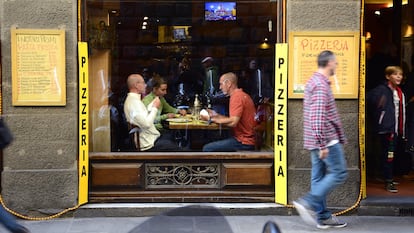Italy plans crackdown on fake restaurant and hotel reviews
The government has approved a bill that includes mandatory identification of users, the right of reply for establishments, and the prohibition of the purchase and sale of reviews

The Italian government is aiming to eradicate fake reviews and opinions on the internet about restaurants and hotels, a phenomenon that is causing increasing concern to the sector due to the considerable damage it can cause to establishments. The influence of reviews on consumers when making a decision about a restaurant, hotel, or museum is a fact supported by numerous studies. In recent years, an illicit industry has developed that exploits and takes advantage of the value provided by public customer evaluations.
Nowadays, leaving a fake review online, whether it is favorable — praising the quality of a restaurant’s dishes — or negative — criticizing, for example, customer service or cleanliness — is quite easy: it takes just a few minutes and can be done under the cover of the anonymity offered by review apps. Posting opinions that do not correspond to reality can lead to practices that are harmful to companies, such as unfair competition, covert advertising, or fraud, which also negatively affects consumers. Removing these types of publications from the internet, however, is usually very complicated.
Giorgia Meloni’s government has launched a fight against fake online reviews to curb this phenomenon. The Cabinet recently approved the first bill in Italy that contemplates the possibility of introducing a regulation to restrict the use of online product and service review platforms. Among other things, it proposes mandatory identification of users who leave reviews, the right of reply for establishments, and the prohibition of the buying and selling of reviews.
The details of the regulations are still to be defined, but for now the Italian government has announced that the idea is that users of review platforms must prove their identity and also demonstrate that they have actually visited the business in question. They will also have a maximum period of 15 days to publish their opinion, which must be “well-founded” and “sufficiently detailed.” On the other hand, hotels and restaurants will be able to request the removal of negative comments in certain cases, such as if they can prove that they have taken measures to resolve the problems reported in the reviews, or if these are considered misleading or false. Nor will reviews be able to be bought or sold, in any way: neither with monetary payments nor through incentives or gifts.
The Italian Minister for Business and Made in Italy Adolfo Urso, who was the driving force behind this bill, has defended the need to “protect market transparency and guarantee truly fair competition, especially in sectors such as tourism or catering, where reputation is often decisive.” The minister has acknowledged that the opinions left online on various platforms or on social networks are “a fundamental tool” for consumers, but he has also warned that “the ease with which they can be manipulated threatens to harm” business owners. “We are facing a complex problem, but one that can be solved,” said Urso.
According to research carried out by the Ministry, online reviews influence 82% of accommodation bookings and 70% of bar and restaurant bookings. Business owners in the sector claim that online reviews have an impact on their turnover of between 6% and 30%, although it is important to note that these figures are difficult to estimate in isolation.
According to the latest transparency report published by the Tripadvisor platform, as of 2022, there were 1.3 million fake reviews published on the site — which were later removed — within a set of 30 million opinions, equivalent to about 4% of the total reviews.
This number is on the rise: according to the same report two years earlier, there were 943,000 fake reviews, of which around 24,000 were positive reviews posted in exchange for a commission. On Tripadvisor, half of the paid positive reviews come from six countries, including Italy (5%), with India and Russia at the top of the list, which generate respectively 15.6% and 13% of the paid reviews on this platform.
Misleading negative reviews are usually posted by competitors of the reviewed hotels or restaurants, to discourage consumers from visiting a particular establishment, favoring their own business instead. In other cases, the reviews are positive but are manipulated and unreliable because the reviewers have received payment, reimbursement of expenses, gifts, or other incentives.
The government’s bill has been generally welcomed by both business and consumer organizations. The Italian federation of public establishments, Fipe Confcommercio, which represents more than 335,000 businesses in the catering, tourism, and leisure sectors, welcomed what it said was “an important step forward in the protection of consumers and businesses.” It denounced that “the phenomenon of misleading reviews has been hampering the catering sector for too long, causing economic damage and undermining consumer confidence.”
The national consumer protection association, Assoutenti, has also welcomed the proposal: “Any measure that guarantees greater transparency for consumers in their choice of products and services is welcome.” But it has also called for direct intervention in the field of social networks, “where countless influencers review restaurants, clubs, spas, and accommodation every day through content that appears to be personal and disinterested opinions, but which are actually the result of commercial agreements or gift concessions that are not always clearly communicated to the public.”
The Italian government’s proposal is only the first step in a process that promises to be long and that will begin to be debated in parliament in the coming weeks. In any case, it has put on the table a pressing debate that other countries and large distribution platforms, such as Amazon, are also facing. The European Union has already put the focus on the veracity of opinions posted on the internet. It has pointed out on several occasions that a large number of important websites potentially infringe the directive on unfair commercial practices, which requires that truthful information be presented to consumers so that they can make an informed choice.
In the general field of online reviews, beyond the specifics of restaurants, hotels, and tourist attractions, in Spain since 2022, in compliance with the European directive, companies are obliged to indicate and guarantee that the reviews that accompany their goods and services, for example on their websites, are from people who have actually used or purchased them.
Sign up for our weekly newsletter to get more English-language news coverage from EL PAÍS USA Edition
Tu suscripción se está usando en otro dispositivo
¿Quieres añadir otro usuario a tu suscripción?
Si continúas leyendo en este dispositivo, no se podrá leer en el otro.
FlechaTu suscripción se está usando en otro dispositivo y solo puedes acceder a EL PAÍS desde un dispositivo a la vez.
Si quieres compartir tu cuenta, cambia tu suscripción a la modalidad Premium, así podrás añadir otro usuario. Cada uno accederá con su propia cuenta de email, lo que os permitirá personalizar vuestra experiencia en EL PAÍS.
¿Tienes una suscripción de empresa? Accede aquí para contratar más cuentas.
En el caso de no saber quién está usando tu cuenta, te recomendamos cambiar tu contraseña aquí.
Si decides continuar compartiendo tu cuenta, este mensaje se mostrará en tu dispositivo y en el de la otra persona que está usando tu cuenta de forma indefinida, afectando a tu experiencia de lectura. Puedes consultar aquí los términos y condiciones de la suscripción digital.









































